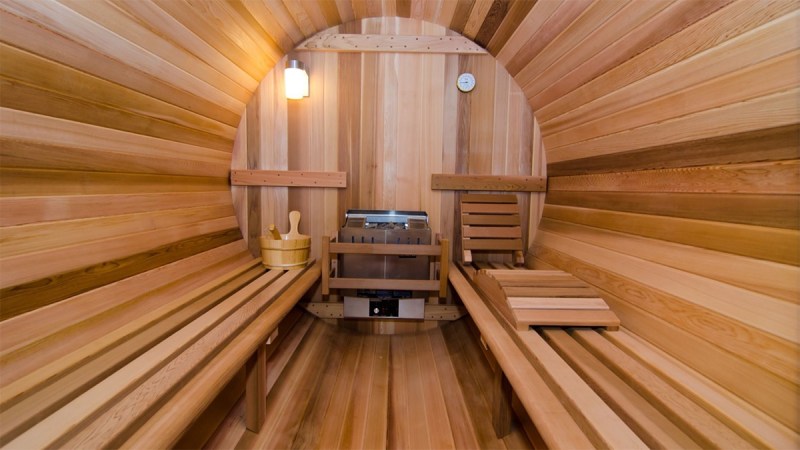Saunas have been used for thousands of years, and for good reasons. With their numerous health benefits, ranging from helping detoxify the body to helping reduce all-cause mortality, it’s no wonder saunas are a worldwide, popular leisure activity. However, as with all things in life, you can have too much of a good thing. So when it comes to saunas, the question then you need to ask is: How do you use a sauna?

When you’re first looking into sauna benefits, you might search for a lot of things, such as how to use a sauna, what are some sauna benefits, and all sorts of other questions. We enlisted the help of experts to answer some of the most commonly asked questions to get their take on the matter.
Benefits of using a sauna
Having been used for thousands of years, saunas can be extremely beneficial to overall health. Here’s a quick list of some benefits to using them consistently. Saunas can:
- Detoxify skin and help clear pores
- Improve cardiovascular health
- Alleviate muscle soreness
- Help preserve lean muscle tissue
- Help you relax and get your zen on
Dr. Mahmud Kara, the creator of KaraMD with more than 30 years of experience treating patients at the Cleveland Clinic, noted that “one of the greatest benefits of saunas is relaxation or stress reduction.”
Why?
“We weren’t built for the 21st century, and our ‘always on’ lifestyle can lead to chronic stress, which over time can be detrimental to our health. Therefore, stress reduction is essential to live and feel well, physically and mentally, and saunas can be a useful tool for relaxation and stress reduction. Studies have also found that saunas can help reduce joint and muscle tension and alleviate aches and pains.”
Medically speaking, sauna benefits are even more interesting.
“Saunas help relax the blood vessels and dilate them, which is important for increasing blood flow and can help with recovery after exercise as well as cardiovascular health,” Dr. Kara says. “Research also suggests that saunas may be effective for toxin removal as one of the ways the liver and kidneys excrete toxins is through sweat.”
Now that we know some of the potential benefits, let’s get the experts’ takes on saunas.
How long should you stay in a sauna?
“It depends on the type,” said Dr. Tom Ingegno, doctor of acupuncture and Chinese medicine, who owns and operates Charm City Integrative Health in Baltimore, Maryland. His clinic has been offering infrared sauna therapy since 2016. “Finnish (traditional) saunas run at a higher heat, usually 160–195 degrees Fahrenheit. As such, most studies suggest that 10–20 minutes is enough. Infrared saunas usually have a maximum temperature of 140 degrees Fahrenheit, and people can stay in them for 20–60 minutes. Regardless of the sauna type, you want to sweat but stay safe. Your tolerance and comfort can vary from session to session.”
Benjamin Okyere, a data engineer, fitness trainer, and founder of Stress Reliever’s Club, added that how long you can stay in a sauna also depends on the person. “It depends on factors such as your fitness level, how hot the sauna is, and why you are using the sauna,” he explained. If you are new to saunas, it is best to start with shorter periods and gradually increase the length of time you spend in the sauna. Generally, it’s best to stay for no more than 15 minutes at a time. With frequent breaks, you can safely enjoy the benefits of a sauna for up to 45 minutes.”
Can you use a sauna daily?
You can, but you probably don’t need to.
“Yes, you can use a sauna daily, but you should be careful not to overdo it. Your body needs time to recover and regulate its temperature in between sessions,” Okyere said.
“The most impressive benefit that seems to occur with regular sauna use [is] a decrease in all-cause mortality,” added Dr. Ingegno. “This means your likelihood of dying from cardiovascular issues like heart attacks and other diseases falls. With sauna use around five times per week and totaling a little over 30 minutes (in the hotter Finnish saunas, longer for IR saunas), you can reduce the risk of cardiovascular disease and heart attacks by over 40%. That’s pretty impressive. You can use the sauna daily, but the benefits seem to max out at [five times] per week.”
As far as timing goes, Dr. Kara said, “The American College of Sports Medicine and American Sauna Society recommends 5–10 minutes for beginners and 15–20 minutes at maximum for other users. Furthermore, most facilities will limit sauna sessions to three to four times per week.”

Expert tips for sauna usage
Dr. Ingegno, Okyere and Dr. Kara offered several tips for making the most of your sauna time:
- Stay hydrated, bring a large container of water in the sauna, and try to replace what [you are] sweating out.
- If your head tends to get too hot, try a traditional wool hat. Sauna hats are a thing. They insulate the head and keep the heat out. It can make your experience more comfortable.
- Ceramic aroma therapy statues can add to the experience. You can put a few drops of essential oil on them and place them in the sauna. Things like peppermint and eucalyptus can really open up the airways when combined with the heat.
- Take breaks in between sauna sessions to give your body time to recover.
- Make sure to dress appropriately in loose-fitting clothing.
- Focus on your breathing and savor the experience of being in the sauna — mentally focus on why you are there and what benefits you hope to gain from it.
- Avoid engaging in any physical activities while in the sauna. This will help you relax and take advantage of all its healing benefits.
- Like with any change in diet or exercise, speak to a medical professional before beginning a sauna routine because everyone’s body is different.
Are there any risks?
“One of the bigger risks of using a sauna is dehydration. Make sure to drink plenty of water before, during, and after using saunas. Saunas may also trigger or worsen symptoms of certain conditions like asthma or other breathing conditions because of the dry heat,” Dr. Kara said.
Sweat it out

With the sauna’s numerous health benefits and ease of use, there is almost no reason why anyone would want to skip a sauna session. Close your eyes and visualize a tropical beach, and it’s almost as if you’re truly there.




